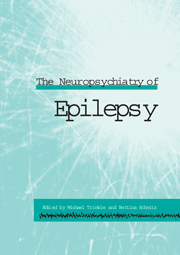Book contents
- Frontmatter
- Contents
- List of contributors
- Part I Background
- Part II Clinical aspects
- 4 The psychiatry of idiopathic generalized epilepsy
- 5 Epilepsy and learning disorders
- 6 Subtle cognitive and behavioural effects of epilepsy
- 7 Aggression and epilepsy
- 8 Epilepsy and suicide: a neuropsychiatric analysis
- 9 Postictal psychoses, revisited
- Part III Cognitive aspects
- Part IV Nonepileptic attacks
- Part V Treatment complications
- Part VI Treatment
- Index
6 - Subtle cognitive and behavioural effects of epilepsy
Published online by Cambridge University Press: 05 October 2010
- Frontmatter
- Contents
- List of contributors
- Part I Background
- Part II Clinical aspects
- 4 The psychiatry of idiopathic generalized epilepsy
- 5 Epilepsy and learning disorders
- 6 Subtle cognitive and behavioural effects of epilepsy
- 7 Aggression and epilepsy
- 8 Epilepsy and suicide: a neuropsychiatric analysis
- 9 Postictal psychoses, revisited
- Part III Cognitive aspects
- Part IV Nonepileptic attacks
- Part V Treatment complications
- Part VI Treatment
- Index
Summary
Introduction
Both cognitive and behavioural problems are common in people with epilepsy. Epidemiological studies have indicated that around 50% of children with epilepsy have some schooling difficulties and that many have behavioural problems (Besag et al., 1999; Pazzaglia and Frank-Pazzaglia, 1976; Ross et al., 1980; Sillanpää, 1992). The National Child Development Study in the UK (Ross et al., 1980) revealed that only 67% of children with epilepsy were attending a mainstream school at age 11. Using this broad-brush measure it was evident that a large proportion of the children with epilepsy had significant schooling problems. The work of Pazzaglia and Pazzaglia in Cesena, Italy, (Pazzaglia and Frank-Pazzaglia, 1976) also confirmed that a high proportion of children were underachieving at school. The excellent epidemiological studies of Sillanpää (Sillanpää, 1992) in Finland showed that 31.4% of this unselected sample of children had mental retardation.
In a recent study carried out in the London Borough of Lambeth Besag et al. (1999) surveyed 127 children with epilepsy. The parents perceived that the children had schooling problems or learning disability in 65% and 48% were disturbed on Rutter Behavioural Scales. Sixty-two per cent of the scores indicated a significant impact on quality of life which was moderate or great in 35%. These studies suggest that schooling and behavioural difficulties constitute a major problem in childhood epilepsy. There is a lack of data, however, to indicate the causes of the problems encountered, either in children or adults.
- Type
- Chapter
- Information
- The Neuropsychiatry of Epilepsy , pp. 70 - 80Publisher: Cambridge University PressPrint publication year: 2002
- 5
- Cited by



